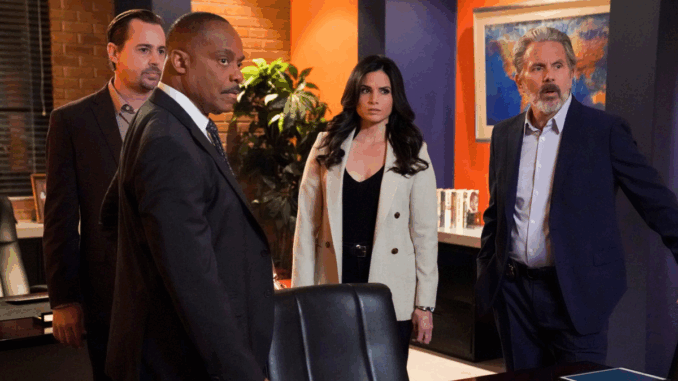
Let’s be honest: NCIS: Origins has been nothing short of a masterclass in prequel storytelling. It’s taken what we know about Leroy Jethro Gibbs and peeled back the layers, giving us raw, emotional insight into the people who shaped him.
But when the Season 1 finale aired, fans were divided. The emotional center of the story — Lala — was left with an ambiguous fate. Depending on how you interpret the final scenes, Lala either survives… or dies. But here’s the twist:
The best version of that finale — the one that actually sticks, that actually means something — is the one where Lala dies.
And I’ll tell you why.
Lala’s Death Isn’t Just Shock Value — It Has Purpose
We’re not rooting for tragedy here. But from a storytelling and character arc perspective, Lala’s death elevates the narrative from good to unforgettable.
Gibbs Needed a Defining Loss
Every Legend Has a Tragic Origin
You don’t become Gibbs without carrying a deep, personal scar. We’ve always known that something turned him from a bright-eyed Marine into the stoic, head-slapping team leader we met in NCIS.
Lala Is That Emotional Catalyst
Lala wasn’t just a love interest or a side character. She was the emotional compass of the story. Losing her doesn’t just hurt Gibbs — it reshapes him. It becomes the moment that defines his emotional detachment for decades to come.
It Raises the Stakes in a Meaningful Way
Real Consequences, Not Plot Armor
In too many shows, characters miraculously survive near-death moments because writers fear backlash. But that cheapens the danger. Lala’s death proves NCIS: Origins isn’t afraid to go there.

Actions Now Have Weight
Her death forces the audience to re-examine every interaction Gibbs has in the original series with a new lens. Suddenly, his hesitation to open up? His rigid moral code? It all makes painful, perfect sense.
It Makes Gibbs More Human
Vulnerability Before the Walls Went Up
We rarely get to see Gibbs open — and Origins gave us that. Through Lala, we saw the version of Gibbs who smiled, trusted, and loved freely.
Taking that away? It doesn’t ruin him. It explains him.
The Love Story Wasn’t Wasted — It Was Completed
A Relationship That Meant Something
Killing off Lala doesn’t erase her importance. It cements it. Their bond becomes immortal not because it lasted, but because it didn’t. Like all unforgettable love stories, it ends in tragedy — and that’s why it matters.
A Character’s Impact Isn’t Measured by Their Survival
She Left a Legacy
Lala’s role isn’t minimized by her death. On the contrary, it becomes her most powerful moment. She’s the one who reminds Gibbs — and the audience — of what’s worth protecting.
Alternate Versions Don’t Hit As Hard
If She Lives, What Changes?
If Lala survives, she either leaves or is sidelined — or worse, becomes another dramatic reunion setup later. That dilutes the impact of the finale and risks making her a plot device rather than a pivotal figure.
Grief Is the Catalyst for Legacy
Gibbs Carries Her With Him
In NCIS, Gibbs often reflects on loss — Shannon, Kelly, Kate, Jenny. Lala belongs in that circle. She’s part of the origin of his grief, part of what forges the man he becomes.
A Powerful Ending Requires Real Stakes
It Makes Origins Stand Out
So many prequels play it safe. They fill in backstory but avoid emotional risk. NCIS: Origins takes a bold swing with Lala’s death — and it connects.
Fan Reaction Proves It Works
The Conversations Haven’t Stopped
Fans are still arguing over her fate. That’s not a flaw — that’s proof the ending had power. A forgettable finale doesn’t spark debate. This one did — and it’s still echoing.
Storytelling Is About Impact — Not Comfort
TV isn’t therapy. It’s a mirror, and sometimes what we need to see is how loss shapes people, how grief defines their choices, and how resilience is born through pain.
The Writers Got It Right
Yes, it hurt. But that’s exactly why it worked. The choice to leave Lala’s fate open was clever — but the version where she dies? That’s the one that completes the emotional arc. That’s the one where Gibbs becomes Gibbs.
📣 Conclusion: The Best Version Is the Bravest One
NCIS: Origins delivered a finale that could be interpreted in different ways — but only one interpretation gives Gibbs the emotional depth we’ve always known existed beneath the surface.
The version where Lala dies isn’t just about loss — it’s about origin. Painful, formative, unforgettable. It’s where the legend begins.
❓FAQs About the NCIS: Origins Finale
1. Is Lala really dead in NCIS: Origins?
The show left her fate intentionally ambiguous — but all signs, emotionally and thematically, point to her death.
2. Why would the writers kill off such a beloved character?
Because her death creates deeper meaning and stronger emotional stakes for Gibbs’ journey. It’s bold, but effective.
3. Will we see more of Lala in flashbacks in future seasons?
It’s possible. Even in death, Lala’s presence can continue to guide and haunt Gibbs through flashbacks or memories.
4. How does Lala’s death connect to Gibbs’ behavior in NCIS?
It helps explain his emotional distance, his commitment to justice, and his refusal to get close to people again.
5. Was this the best NCIS: Origins episode so far?
Many fans and critics think so — the finale was bold, emotional, and beautifully crafted. It left a lasting impact.